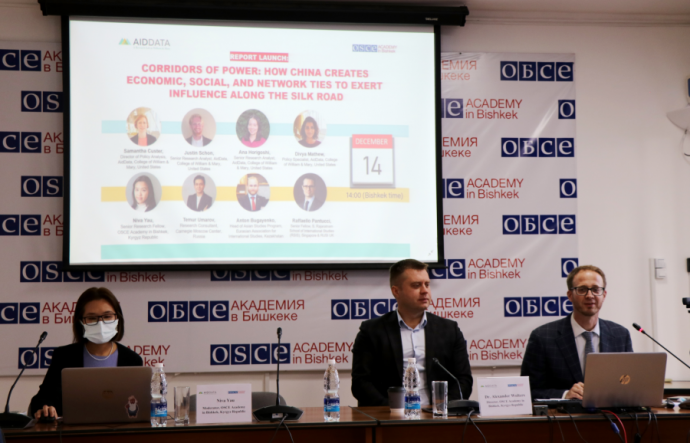News
Report Launch: Corridors of Power: How China Creates Economic, Social, and Network Ties to Exert Influence Along the Silk Road
On 14 December the OSCE Academy hosted the launch event and panel discussion “Corridors of Power: How China Creates Economic, Social, and Network Ties to Exert Influence in South and Central Asia,” organized jointly with AidData, a research lab at William&Mary (a US-based university). This event featured a presentation and panel discussion related to an extensive new study on Chinese public diplomacy efforts in the region, ranging from financing and education to culture and social media. Participants got an in-depth look at how Beijing has used a broad and diverse toolkit to cultivate economic and soft power influence in South and Central Asia over the last two decades.
The event was opened by Dr. Alexander Wolters, Director of the OSCE Academy, followed by a brief introduction of Central Asia Data-Gathering and Analysis Team (CADGAT) BRI in Central Asia datasets by Dr. Roman Vakulchuk, a Senior Research Fellow at the Norwegian Institute of International Affairs (NUPI). Following the opening, Samantha Custer, Director of the AidData's Policy Analysis Unit, presented a report and answered to the question from highly engaged audience. After the report presentation three Discussants - Temur Umarov, Research Consultant, Carnegie Moscow Center, Russia; Anton Bugayenko, Head of Asian Studies Program, Eurasian Association for International Studies, former Head Expert of Chinese and Asian studies at Institute of World Economics and Politics (IWEP), Kazakhstan; and Raffaello Pantucci, Senior Fellow, S. Rajaratnam School of International Studies (RSIS), Singapore, Senior Associate Fellow, Royal United Services Institute (RUSI), United Kingdom, provided their reflections on the report. The panels were moderated by Niva Yau, Research Fellow of the OSCE Academy. The event was held in hybrid format and was attended by Swiss Ambassador Olivier Bangerter, experts and researchers.



 Русская версия
Русская версия